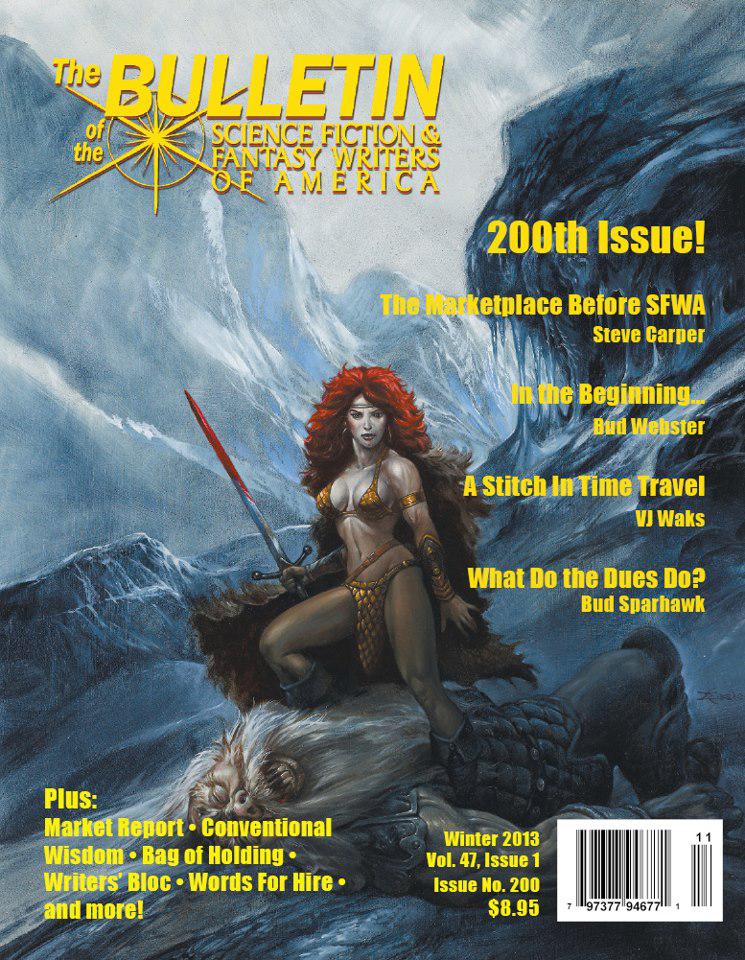Debates about sexism in the geekier corners of the pop-culture universe seem to be operating at amplified volume—and in some cases, to good effect—over the past several years, from the woman dressed as Batgirl asking DC Comics executives tough questions at Comic-Con to the attacks on and outpouring of support for feminist video blogger Anita Sarkeesian after she Kickstarted a project to produce a series of videos about the depiction of women in video games. And in recent weeks, the question of who belongs in science fiction and fantasy has escalated beyond fans and critics into the Science Fiction and Fantasy Writers of America, the professional association for genre fiction writers.
At issue is a series of pieces that ran in the SFWA Bulletin, the association’s publication. After a period of irregular publication, the publication was resurrected by Jean Rabe, a science fiction author and editor who has written for the Dungeons and Dragons, Star Wars, and BattleTech franchises. Under Rabe’s editorial leadership, Bulletin published a number of articles that lead some members to exit the association. The cover of one issue featured an image of a woman in a chain-mail bikini, a decided throwback to science fiction’s cheesecakier days. That same issue featured a conversation between two male writers, Mike Resnick and Barry N. Malzberg, ostensibly devoted to a discussion of the genre’s female editors but that included odd comments about specific women’s appearances. A subsequent issue featured another piece by a man praising Barbie as an image of female submissiveness. (Presumably, he missed the great young-adult novels in which Barbie jet-sets around in pursuit of modeling opportunities and her 2012 run for president.) Then, Resnick and Malzberg responded to reader feedback to their comments by crying censorship. Ultimately, Rabe announced that she would resign.
John Scalzi, the president of SFWA and an outspoken feminist, referred me to his statement to the association, which he’s also made public: “Too many of our members have felt their contributions and their place in the industry and within the organization belittled; too many of our members see other members being treated so,” he wrote. “If we believe that we represent and serve all our members and not just some of them, then we need to listen and address those member concerns.”
But it may not be so easy for SFWA to bridge the gap between the two camps that have emerged from within its membership and to convince members and prospective members that they’re all truly welcome. It’s a debate that mirrors the nasty way some science fiction and fantasy fans approach so-called “fake geek girls” and raises the same question: Whose participation in genre fiction is more valid?
“I’m not a member of SFWA because I looked at their website and composition and quickly came to the conclusion that I wasn’t the target demographic,” wrote Delilah S. Dawson, who pens steampunk romances, in a post about the controversy. “Sure, I write science fiction and fantasy, but once you throw romance and sex into the mix, it’s generally agreed that my book will sit on the Romance shelf instead. Never mind the intricate alternate history steampunk world that’s based on the supposition that the majority of prey animals have become predators. Shirtless dude on the cover? Romance. End of story.” Dawson describes volunteering at a convention where a guest of honor called the sorts of stories she writes “vampire porn” and told her “that women like me were ruining his genre”—even though, as it turns out, that author wrote sexually charged works himself. Gratifying his own fantasies, for that author, was a perfectly legitimate use of science fiction, but women to gratify theirs, even in well-developed fantastical worlds, was completely out.
In a report back from his trip to the Romantic Times book convention earlier this year, Scalzi wrote about what a pleasant experience he had. “No one questioned my reasoning for being there, or suggested, say, that I was a Fake Romance Boy, or quizzed me about who my favorite romance author was or if I could recite that author’s bibliography to their satisfaction. I certainly wasn’t skeezed on,” he told his readers. “On the contrary, people went out of their way to ask me if I was enjoying myself and to let me know they were glad I was there. When I admitted ignorance about certain writers or genre details they were happy to expand my knowledge, and they wanted to know more about what I did and my own experiences as a writer. ” He asked at the time why it was so hard for science fiction and fantasy fans to behave the same way, and focus on growing their genre rather than gating it.
In the meantime, the Bulletin will be on hiatus as the organization looks for a new editor.
